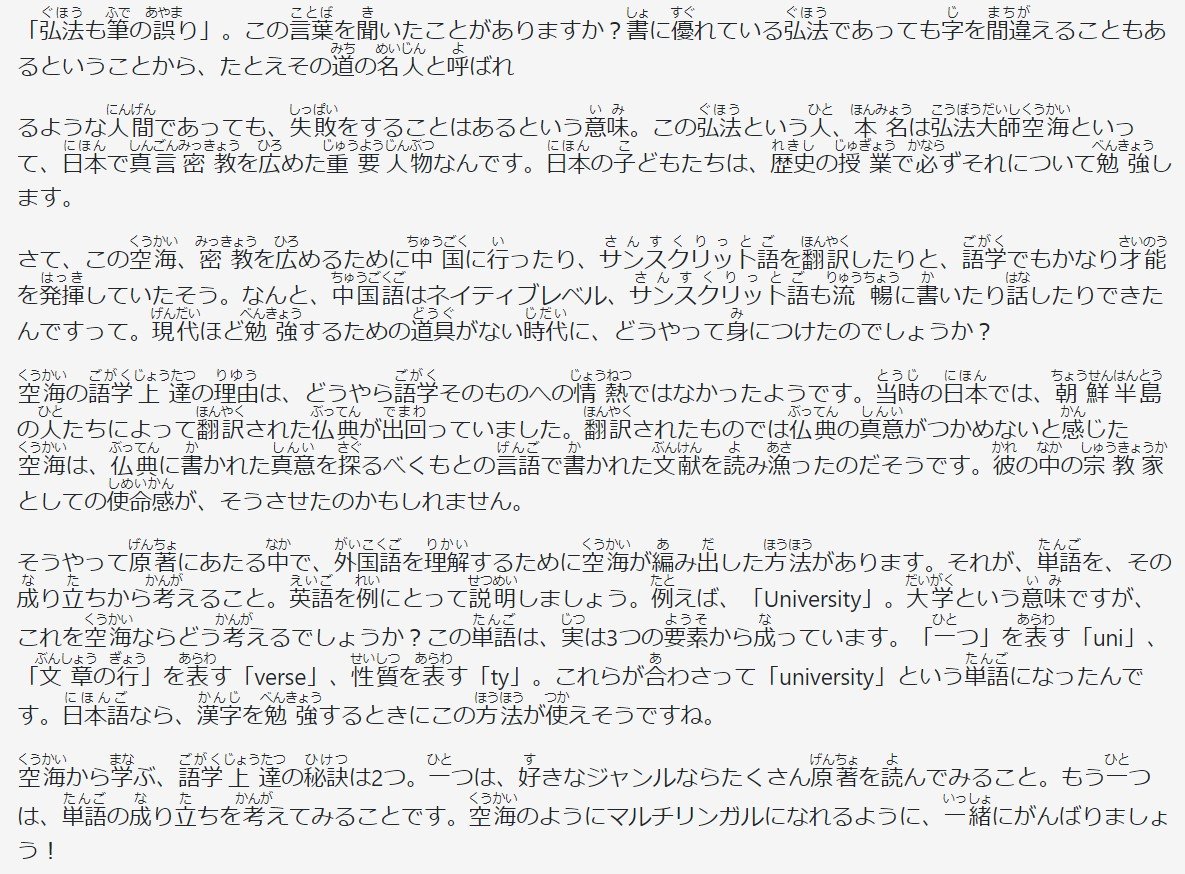108_The secret of language progress from Kukai_空海に学ぶ語学上達の秘訣
[Hiragana and English ver. is below]
「弘法も筆の誤り」。この言葉を聞いたことがありますか?書に優れている弘法であっても字を間違えることもあるということから、たとえその道の名人と呼ばれるような人間であっても、失敗をすることはあるという意味。この弘法という人、本名は弘法大師空海といって、日本で真言密教を広めた重要人物なんです。日本の子どもたちは、歴史の授業で必ずそれについて勉強します。
さて、この空海、密教を広めるために中国に行ったり、サンスクリット語を翻訳したりと、語学でもかなり才能を発揮していたそう。なんと、中国語はネイティブレベル、サンスクリット語も流暢に書いたり話したりできたんですって。現代ほど勉強するための道具がない時代に、どうやって身につけたのでしょうか?
空海の語学上達の理由は、どうやら語学そのものへの情熱ではなかったようです。当時の日本では、朝鮮半島の人たちによって翻訳された仏典が出回っていました。翻訳されたものでは仏典の真意がつかめないと感じた空海は、仏典に書かれた真意を探るべくもとの言語で書かれた文献を読み漁ったのだそうです。彼の中の宗教家としての使命感が、そうさせたのかもしれません。
そうやって原著にあたる中で、外国語を理解するために空海が編み出した方法があります。それが、単語を、その成り立ちから考えること。英語を例にとって説明しましょう。例えば、「University」。大学という意味ですが、これを空海ならどう考えるでしょうか?この単語は、実は3つの要素から成っています。「一つ」を表す「uni」、「文章の行」を表す「verse」、性質を表す「ty」。これらが合わさって「university」という単語になったんです。日本語なら、漢字を勉強するときにこの方法が使えそうですね。
空海から学ぶ、語学上達の秘訣は2つ。一つは、好きなジャンルならたくさん原著を読んでみること。もう一つは、単語の成り立ちを考えてみることです。空海のようにマルチリンガルになれるように、一緒にがんばりましょう!
[Hiragana]
※弘法(ぐほう)となっていますが、「こうぼう」です
[English]
“Even Kōbō's handwriting contains mistakes.” Have you ever heard this saying? It means that even Kobo, who is an excellent calligrapher, can make mistakes in writing. So even someone who is called a master in his field can make mistakes. Kobo, whose real name is Kobo Daishi Kukai, was a key figure in spreading Shingon Esoteric Buddhism in Japan. Without exception, Japanese children are required to study about him in their history classes.
Kukai not only went to China to spread esoteric Buddhism, but was also very talented in languages, and he even translated Sanskrit. He spoke Chinese almost like anative speakers and was fluent in Sanskrit. How did he learn these languages at a time when there were not as many tools for language learning as there are today?
The reason for Kukai's language progress, apparently, was not his passion for the language itself. At that time, Buddhist scriptures, translated by people from the Korean peninsula, were used all over Japan. Kukai felt that he could not grasp the true meaning of the Buddhist scriptures from the Korean translations, so he read the literature written in the original language in order to find out the true meaning of the scriptures. Perhaps it was his vocational call as a religious man that compelled him to do so.
In doing so, Kukai developed a method for understanding foreign languages. His learning methodology was to think of words in terms of their origins. Let us take English as an example. Let's use the word "University". What would Kukai think of this word? This word is actually composed of three elements: uni which means one, and vers from versus, which means turned or a line of writing, combined into universus, which means whole. The suffix ty denotes quality or state.” These separate elements are combined to form the word university. In Japanese, this method could be used when studying Kanji characters.
We can learn two secrets from Kukai to improve our language skills. One is to read many original works in your favorite genre. The other is to think about the origins of words. Let's work together to become a multilingual person like Kukai!
